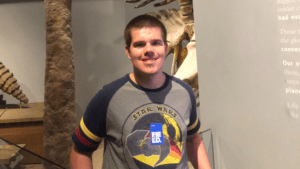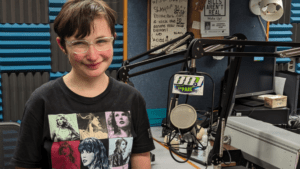Some of the biggest fears I’ve ever had in my life are the fear of the unexpected, fear of change, and the fear that I would be looked at differently. This all came into focus my first year of college at Seton Hall University. Before college, I had only told a few people that I was on the spectrum. This was mainly because when I was younger, when my parents would tell me I was autistic, I would have no idea what that meant or how that affected me. I only knew one thing – I was not artistic.
In both grammar school and high school, I never felt the need to tell anyone either since I went to a private school, Community Lower/Community High School in Teaneck, N.J., for students with learning disabilities. There was a certain comfort that I enjoyed, knowing that I was with others I could relate to. We all had something with some letters so it wasn’t a big deal.
When college came along, I didn’t know what to expect. When I was deciding on what college to go to, I chose the college that best matched my future career goals (sports management), not the school that would be best match my disability (a school with more accommodations). While well-meaning, the idea of me surviving at a post-secondary program which wasn’t the recommended choice by my high school academic advisors. They saw it as a huge mistake, which they thought would hurt me in the long run. I honestly could care less, looking back.
This brings me to the day I came out about my disability publicly. It was during one of my freshman classes in “Oral Communication.” My professor had told me to pick a topic that I knew a lot about to speak about for 10 to 15 minutes. The obvious choice in my mind was to pick autism, considering my public speaking skills were still very limited and I thought it would be an easy subject to talk about because I know a lot about it. The theme of the presentation was going to be “how autism impacts playing basketball while highlighting the story of Jason McElwain’s historic game, which illustrates how someone with autism can overcome the odds.”
For those who don’t know Jason McElwain, he was the high school basketball team water boy, who has autism, turned basketball star. He didn’t play one game in high school, until the last game of his senior year when he scored six three-pointers in a matter of minutes. This game became one of the bigger underdog stories in recent memory. So now I was set. I would speak about him for five minutes, present a general overview of autism for another five minutes and than close by telling them that I had autism.
The day of the presentation, everything went according to plan. I had spoken about all of my main points; however, when it came down to telling my fellow peers I had autism in my closing statement … I froze. The thoughts that were running through my head were endless. What happens if they treat me differently? What happens if no one wants to have anything to do with someone who is different? Finally, after I started speaking again I reminded myself that the one fear, the one fear that I never want to let take the better of me is the fear of being who I am. Being me had taken me to a post-secondary education and being me was the only way I was going to get through this presentation.
At the end, my closing statement of my presentation was: “Autism can not define who you are, only you can define autism. I have autism so I know especially, and I ended up the captain of my high school basketball team so I can relate to this message.” As soon as this was said, I was applauded and given a standing ovation by both my professor and my peers. This was a wonderful feeling.
After the speech, I was very open to all my peers about being on the spectrum and have been since this day. Many people, both with autism and not, ask me if telling people I am on the spectrum was a mistake, and truth be told it has only made me stronger. Granted, things are not perfect. I am still judged and looked at by countless people as broken. I don’t dislike these people, however I pity them. People are still very unaware, sometimes ignorant and sometimes afraid of what might be different. During my time at Seton Hall, I have founded an organization to spread disability awareness called Student Disability Awareness (SDA) and founded a non-profit called KFM Making a Difference in the Community. Both of these organizations have meant a lot to me as I continue to promote disability activism throughout New Jersey. Since the days of that Oral Communication class I’ve gone on to speak at several different venues about my story and am hoping to continue to mentor and help those with and without disabilities who want to become more aware of disability awareness.













